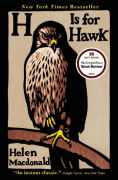Macdonald’s memoir has won prizes and gotten rave reviews; it deserves them all. She lays bare her emotional journey in language that is achingly precise, with moments of grace that left me breathless. In a rare consensus, my book club all thought it a remarkable, if harrowing, story.
There are three strands to this book. The most obvious is her story of raising and training a hawk—and not just any hawk, but a goshawk, fiercest and most stubborn of them all, whom she names Mabel. Then there is the motivation behind her decision to adopt the hawk: her grief over her father’s death, which is wound tightly through the story of training Mabel. The third strand tells of T. H. White’s life and his attempts to train a goshawk.
The images in the first few pages tell us that we are going to be in for a rough ride. She is headed to an area called the Brecklands: the broken lands. In Neolithic times, it was the center of the flint industry. She gives us half-eaten pigeons and a fragment of a songbird’s leg, bomb craters and crumbled buildings on a base where nuclear bombs were stored. She walks through clearcut forest patches with torn roots, where even the light is broken. Amid all this harshness and death, she gives us a pair of goshawks in a startlingly apt description:
. . . they were loving the space between each other, and carving it into all sorts of beautiful concentric chords and distances. A couple of flaps, and the male, the tiercel, would be above the female, and then he’d drift north of her, and then slip down, fast, like a knife-cut, a smooth calligraphic scrawl underneath her, and she’d dip a wing, and then they’d soar up again.
Who cares about mixed metaphors when the montage works so well? She describes her difficulty remembering the days immediately following her father’s death: “The memories are like heavy blocks of glass. I can put them down in different places but they don’t make a story.”
Even individual words shiver and resonate, such as when she speaks of the falconers with “vowels that bespoke Eton and Oxford”, conjuring images of made-to-order suits.
It’s hard for a writer to balance three strands of story. At points, the strands are explicitly intertwined and other times left to echo against each other. Some of us in the book club gloried in the knowledgeable details of training Mabel, while others found that part repetitive. Several people thought there was too much about White’s tragic life and unintentionally cruel attempts to train his hawk.
What moved all of us though, was Macdonald’s growing identification with her hawk, the way they played together, understood each other, partnered in the hunt. While not explicitly stated, it seemed obvious that she saw in Mable not just companionship, not just a challenging task, but an escape from her misery, even a way to control death itself.
Some of us felt qualms about taming a wild creature. Macdonald makes it clear at the very beginning that it is the breeders and trainers who have brought these hawks back from the edge of extinction. Still, when I watch the hawks circling and diving into the woods behind my house, I cannot imagine any justification for taming them to my commands. Our relationship to animals is a complicated business, and it is to Macdonald’s credit that she provides us space and experience to give shape to our discussion.
Macdonald’s long experience with hawks, her wide reading and close attention to her surroundings enrich almost every passage in this book. There are gorgeous descriptions of chalk fields and brambles and forests. There are references to other books, such as to J. A. Baker’s The Peregrine, which I read several years ago. Sharing some of her research into White’s life, she comes up with surprising insights into some of the sources for incidents in his beloved book The Once and Future King.
There is a lot of loss in this book, and Macdonald doesn’t flinch from showing you gory death close up. There is also much that is sweet and even triumphant, such as Mabel playing catch with her or the memory of her father’s quirky quest to photograph all the bridges across the Thames. And like the best memoirs, it gives us a chance to live someone else’s life for a bit, experience the world as they do.
Have you read a memoir that has changed your view of the world?
